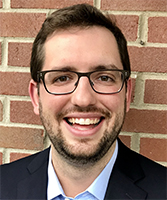Seminars
Dr. Stephen DeWitt
Computational Sciences and Engineering Division
Oak Ridge National Laboratory
Toward Simulation-aided Microstructure Control During Additive Manufacturing

ABSTRACT: Interest in additive manufacturing has grown significantly in recent years, in large part due to its inherent flexibility. This flexibility gives potential for complex part geometries not feasible through other methods as well as optimized, location-specific material properties. The downside of this flexibility is that determining a set of process parameters that yields a defect-free part with a microstructure that yields desirable properties is a very high-dimensional optimization problem that involves phenomena on a wide range of length scales and time scales. In this seminar I will discuss an approach to tackle this problem that combines simulations at the part and microstructure level with experimental observations to develop a process plan and then adapt that plan during the additive manufacturing build to achieve the desired result. I will show how advances in exascale computing, edge computing, new model formulations, in-situ experimental characterization, data assimilation, and machine learning make this problem tractable, and will present initial progress in bringing these components together.
BIOGRAPHY: Steve DeWitt is a computational scientist in the Scalable Algorithms and Coupled Physics Group in the Computational Sciences and Engineering Division. Before joining ORNL in 2019, he spent a number of years at the University of Michigan, where he received a BSE in Engineering Physics, a PhD in Applied Physics, and then held a research faculty position in the Department of Materials Science and Engineering. His research lies at the intersection of high-performance computing and microstructure evolution in materials. His current work focuses on additive manufacturing applications, but he has also worked on modeling microstructure evolution in magnesium alloys and electrochemical systems.